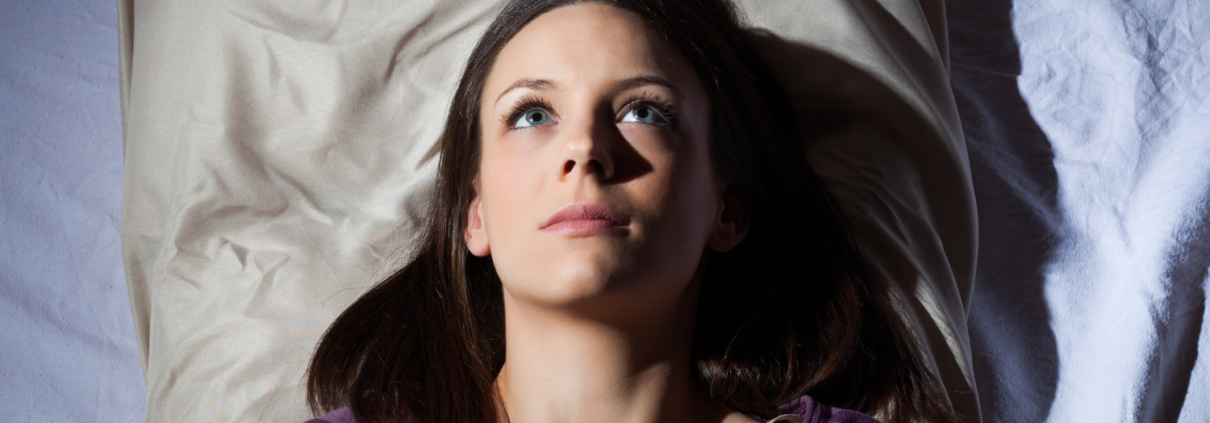Stop Losing Sleep Over Sleep: 3 Common Myths That Increase Sleep Anxiety
Do you find yourself obsessing over the amount of sleep you get each night? Many of us do. Raising my hand here, I have counted myself among the crowd to worry about this one. We live in a society that constantly bombards us with information about the perfect amount of sleep needed to function well. But how much of that information is actually adding to our stress and sleep anxiety?
Here are a few myths that we can push back on that might put your mind a little more at ease when you’re counting those sheep.
Myth 1: Everyone Needs Eight Hours of Sleep
How many times have you stared at the clock on a sleepless night, calculated the hours before the alarm goes off, and realized you weren’t even going to get close to eight hours of sleep?
One of the biggest myths is that everyone needs eight hours of sleep to be healthy and productive. I’m not sure if this was due to a well-intentioned episode of Schoolhouse Rock, but somehow this number got deeply embedded in our collective knowledge bank.
This magic number eight has become a standard benchmark for sleep, and many of us panic if we don’t hit it, convinced we’re setting ourselves up for a lifetime of poor performance and bad health.
But is this really true?
Research shows that the relationship between sleep duration and health is more nuanced than you might think. A 2002 study titled “Mortality Associated With Sleep Duration and Insomnia” found surprising results:
The best survival was found among those who slept 7 hours per night. Participants who reported sleeping 8 hours or more experienced significantly increased mortality hazard, as did those who slept 6 hours or less. The increased risk exceeded 15% for those reporting more than 8.5 hours sleep or less than 3.5 or 4.5 hours.
This data shows that sleeping too little or too much can increase your risk of dying. Interestingly, the highest risk from too little sleep (15%) starts to improve at 4.5 hours, which still sounds like a terrible night to me. If you’re getting a little more than 4.5 hours, your risk is still lower than if you were sleeping for 8.5 hours.
Because of math, I can tell you that 4.5 hours is actually closer to the ideal seven hours of sleep than eight hours is. From a psychological standpoint, not getting 2.5 hours of sleep is better than not getting 3.5 hours of sleep.
So, just remember, if there’s a magic number for sleep, it’s probably around 7 hours – give or take – not 8.
Your body’s sleep needs can vary. What matters more is the quality of sleep you’re getting. Instead of fixating on a set number of hours, pay attention to how you feel during the day. Are you alert and able to function well? If so, you’re likely getting the rest you need.
Myth 2: You Must Meet 100% of Your Sleep Needs Every Night
Another common belief is that you must meet 100% of your sleep needs every night to be healthy and function well. This all-or-nothing thinking sets an unrealistic expectation. It’s normal to sometimes not get enough sleep. Life happens – stress, work deadlines, and family obligations can interfere with sleep.
What’s important is understanding that occasional sleep deficits are part of life. Just like pain or taxes, some sleepless nights are part of being human. What you lack for a night or two, your body will figure out how to make up. No need to be perfect here.
Many people turn to sleep trackers and wearable tech, believing these “objective” tools will help them achieve that elusive 100% of their sleep needs. However, relying on these devices just serves to create additional stress.
When clients show me their sleep tracker data, it rarely tells a good story, often leaving them frustrated and worried, even if they report actually feeling rested. These trackers aren’t designed for this kind of scrutiny (too many other variables in play) and can make you feel like you’re constantly falling short. Who needs that?
This obsession with hitting perfect sleep metrics can actually heighten sleep-related anxiety, making you feel more pressure to meet unrealistic standards.
Again, who needs that?
Myth 3: Not Getting Enough Sleep Will Make You Gain Weight
This worry often stems from sensationalized health reports because so many of us struggle with our weight. According to some in the media, lack of sleep is becoming the “new sitting,” which has become the “new smoking.”
While chronic sleep deprivation can contribute to some health problems, the direct link between occasional lack of sleep and significant weight issues is less clear-cut. Research shows that other factors like diet and physical activity play way more significant roles in managing weight than the amount of shut-eye you’re getting.
A 2013 study by the University of Pennsylvania examined the effects of sleep restriction on weight gain, caloric intake, and meal timing in healthy adults. The findings indicated that yes, sleep restriction can indeed lead to weight gain.
Participants who slept only four hours per night for five consecutive nights gained significantly more weight compared to the control group who slept for 10 hours per night.
Here’s why, though: The sleep-restricted subjects consumed more calories, especially during late-night hours, and had more meals and late-night snacks.
Their lack of sleep wasn’t magically causing their weight gain. Because they were awake longer, they simply had more opportunities to nosh.
So instead of freaking out about not getting enough sleep, focus on areas you can control: exercise and nutrition. Regular physical activity has a more significant impact on managing weight and overall health than sleep alone.
Honestly, if you could do one major thing to improve your health, you’d be better served to start exercising than improving your sleep. Exercise is that big of a deal.
This isn’t to say sleep isn’t important – it is. But the level of anxiety we attach to not getting enough sleep often outweighs the actual risks. By obsessing over sleep, we overlook critical aspects of health that we have more control over, like diet and exercise.
The Impact of Worrying About Sleep
Constantly worrying about not getting enough sleep turns sleep into yet another performance metric, like measuring macros and constantly taking your blood pressure. This kind of focus on something you have very little control over creates a vicious cycle of stress and sleeplessness.
Accept that not every night will be perfect and that occasional sleep deficits are a normal part of life. Focus on sleep as just one piece of the health puzzle. An approach that includes good sleep hygiene, regular exercise, and a balanced diet is the key to well-being and staying resilient to stress.
And stay out of the fridge at night!
Originally published at lorimiller.me.


